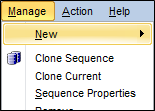Adding a New Sequence
Adding Existing Repeat Sections
Adding a Grouped Submission
Modifying Sequence Properties
Editing a Sequence
Reserving for Edit
Managing Reservations
To add a new sequence, begin by opening GlobalSubmit PUBLISH and choose New > Sequence from the Manage menu; the Add Sequence dialog will be displayed. Adding sequence information will be the same as described in the Application Wizard. However, you may need to set a Related Sequence for your new sequence, if it is being added to an existing Regulatory Activity.

Below is best practice for Related Sequences, based on region:
United States/ FDA
• Always choose a related sequence number for Amendments and Resubmissions. This will allow them to be grouped with top-level application types such as original applications and supplements in order to form regulatory activities. Related sequence numbers cannot be entered for any other submission types.
• Normally, a sequence is only related to a single regulatory activity. There are rare exceptions (for example, an amendment that applies to two supplements).
European Union/ EMA
• Always choose a related sequence for Supplemental Information or Correction to the Published Annexes sequences. This will allow them to be grouped with top-level application types in order to form regulatory activities.
• Related sequences should not be selected for any other submission types.
• It is possible for a sequence to relate to more than one.
Canada/ Health Canada
• Always choose a related sequence number when a new sequence is part of an existing regulatory activity. This will allow all of the sequences in the regulatory activity to be grouped.
• All sequences in the same regulatory activity should have the same sequence type.
• A sequence can only be related to a single sequence in Canada – that is, a sequence cannot be part of more than one regulatory activity.
Australia/ TGA
• Always choose a related sequence number when a new sequence is part of an existing regulatory activity. This will allow all of the sequences in the regulatory activity to be grouped.
• All sequences in the same regulatory activity should have the same sequence type.
• A sequence can be part of more than one regulatory activity, however it is not advised and will show as a technical error.
Switzerland/ SwissMedic
• Always choose a related sequence for Supplemental Information or Correction to the Published Annexes sequences. This will allow them to be grouped with top-level application types in order to form regulatory activities.
• Related sequences should not be selected for any other submission types.
• It is possible for a sequence to relate to more than one Regulatory Activity.